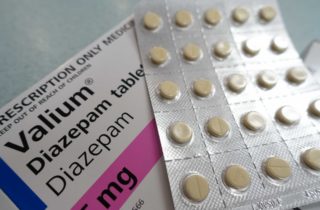When people discover they are addicted to Valium, Windward Way is there to deliver the treatment they need. Our intake experts will answer the questions you have and determine whether our prescription drug detox is appropriate for you. The first step is to get you into our highly praised inpatient detox for Valium—that will offer you the solace you’re seeking.
Valium Detox


Valium Detox
Valium® Detox Center at Windward Way
Windward Way experts know how uncomfortable and dangerous withdrawal from a benzodiazepine like Valium (diazepam) can be. Since our facility is a fully medically supervised Valium detox, you and the people who care about you will know that you’ll be safe. On top of that, you’ll have 24/7 care. It’s what makes our addiction treatment program your “hope away from home” and your rehab center specifically for Valium addiction.
You don’t have to suffer withdrawing from this drug alone. Call us—we guarantee we’ll provide you with the thoughtful consideration you’re entitled to: (855) 491-7694.
Valium is a benzodiazepine and is most often prescribed to help with anxiety disorders. Windward Way’s Valium addiction rehab will first begin with gently allowing your body to rid itself of the drug with the detox phase of your treatment.
Sometimes, other addiction types present themselves alongside a primary addiction. We want to address all your issues to give you the help you deserve—we view each person who participates in our program as a multifaceted, complex whole. It’s this holistic approach to addiction medicine that makes us really stand out in the crowd. Hope is a simple click of the mouse or a call away—do it now. You don’t have to wait to begin the process: (855) 491-7694.
Valium Detox Programs to Help with Withdrawal
Valium is one of the most popular, best-selling drugs in the world. As a sedative with muscle relaxation and amnesic properties, Valium is often prescribed for disorders such as anxiety, panic attacks, alcohol withdrawal, as well as muscle spasm.
The problem with Valium is that it possesses a high risk for abuse and addiction. Because of the sedative and relaxing effects it has on the mind and body and the intensity of the withdrawal symptoms, flushing the drug out of the system and rehabilitation can be rather difficult.
When Does Withdrawal Start After Stopping the Use of Valium?
The acute stage of withdrawal will begin approximately one to four days after someone stops using Valium. The timeframe will vary from individual to individual, but Valium is known to have a variable half-life. In other words, some people can experience no symptoms at all for one or two days while others can feel the first effects as soon as 24 hours after the last dose.
How soon patients will experience the first withdrawal symptoms depends on many factors, such as the frequency of usage, the length of the addiction, the dosage, as well as the physical and mental health of the individual. For example, people that are struggling with emotional and psychological issues such as anxiety and depression are prone to experience rebound anxiety. That means that the moment they stop taking Valium, they will have to deal with the symptoms of their disorder firsthand.
What Are the Common Symptoms of Acute Withdrawal?
Some of the most common symptoms of acute withdrawal from Valium addiction include:
- Physical symptoms: headaches, nausea, vomiting, stomach aches, stomach cramps, shakiness and tremors
- Psychological symptoms: mood swings, cravings, anxiety, panic attacks, depression
- Neurological symptoms: confusion, potential seizures
- Cardiovascular symptoms: increased blood pressure and heart rate
What Are the More Serious Issues Caused by Detoxing from Valium?
Patients that are dealing with addiction and suddenly stop using will expose themselves to a dangerous withdrawal process. Not only will the symptoms make them feel uncomfortable both physically and mentally, but in extreme cases, they can even experience seizures or psychosis.
Why Does It Take So Long to Detoxify Fully?
After the acute stage of the withdrawal process is over, which can take between three and four days, patients will move on to a lengthier stage that commonly takes ten to fourteen days. In this second phase, the person will still experience some withdrawal symptoms, although less intense than in the acute phase. These include mild headaches and fever, lightheadedness, nausea, chills, bouts of anxiety, depression, and increased cravings for Valium.
At this stage of the process, most patients feel like they’re a bit under the weather and often experience feelings of dissatisfaction and melancholy. In some cases, patients can experience as much as ten to fourteen additional days of rebound anxiety. Even after the withdrawal process, people may still battle with anxiety and depression, which is why a full detox process can become even a life-long one.
The post-acute withdrawal syndrome is another problem some people deal with while recovering. This period can take anywhere from weeks to years, during which the person needs ongoing treatment, often in the form of therapy. Symptoms include mood swings, irritability, feelings of dissatisfaction, lack of motivation, and not being able to enjoy things as before.
At-Home Detox vs. Supervised Programs
Based on the severity of their addiction and overall well-being, people can choose between inpatient or outpatient facilities for valium addiction. Patients that struggle with emotional or mental issues during the withdrawal might benefit from inpatient treatment at a facility where they can receive counseling, therapy, and group support, along with 24/7 monitoring and care from professionals.
Outpatient treatment is a good option for those that have a good support system at home and feel they are motivated enough to follow the program. These patients also don’t have any serious medical issues that would require medical supervision.
Deciding to quite Valium and face your addiction is a brave thing to do. However, because the withdrawal symptoms can be extremely challenging and the temptations high, it’s better to detox under the supervision of specialized personnel. Look for a facility that can guide your first steps and provide you with the support you need to overcome your addiction.




